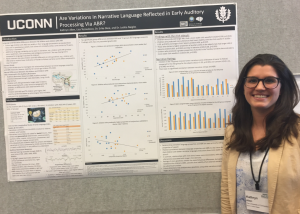Kathryn Allen ’19 (CLAS) earned her bachelor’s degree this spring and shares the value of an unexpected academic “detour” in this essay.
When I first entered UConn, I had a plan. Like many eager incoming freshmen, I would major in Biology; take classes that follow the pre-med track, hopefully gain some research experience, and ultimately apply to medical school the summer of my junior year. However, also true of many freshmen entering the academia environment, that plan would soon change over my time at UConn.
After enjoying a few courses that were not strictly biology focused, I began thinking about a major that would provide both science-oriented subjects and those focused on the humanities. During my sophomore year, I changed my major to Cognitive Science, an interdisciplinary major, and began exploring various subjects including linguistics, psychology, and speech language and hearing science. My new major, while quite small, was a perfect medium that allowed me to enroll in a wider array of unique courses, while still having adequate time to fulfill the pre-med requirements. By the end of my sophomore year, I started to recognize my interest in topics like child development, language, and neurological disorders and function.
At this point in my undergraduate career, I began my search for a lab that would allow me to complete my thesis. Like many uncertain undergraduate students, I had no idea where to begin my search. During my junior year, I reached out to a professor in the psychology department, met with them about their interests and area of research, and eventually began working in their lab. Throughout the semester, I gained valuable experience running clinical trials, but realized that I wished to conduct my thesis on a different topic.
Towards the end of my junior year, my academic advisor, Dr. Naigles mentioned that she had a spot opening up in her lab, as well as a project she thought I might be interested in. I had taken two classes with her during my time at UConn and she proposed a project that had both language and neural components; two areas I was particularly interested in. Knowing that I was behind on my project compared to my classmates, I began doing preliminary work on it during the summer before senior year. I worked from home transcribing audio of story narratives told by both children with Autism Spectrum Disorder and typically developing children. In the fall, I had the opportunity to accompany our graduate student to a home to collect additional story narratives. A graduate student in our lab had previously collected the Auditory Brainstem Response data with an EEG and my project focused on the relationship between story narratives and internal brainstem response for children with Autism Spectrum Disorder (ASD) and typically developing (TD) children.
As I was transcribing the data, I realized noticeable differences between the narratives derived from the children diagnosed with ASD and those from the TD children; however, I could not initially explain why. I proposed to Dr. Naigles a method for assessing if these differences were significant. I generated a document featuring story narrative transcripts from the children, administered the transcripts to peers and had them rate the stories based on how well they understood them. Dr. Naigles was supportive and encouraging of the creative component of the project and suggested that we include it.
After transcription was performed during the summer, I spent the fall administering the transcripts to peers and analyzing the data. Prior to this project, I had never used SPSS besides minimal exposure in STAT1000Q and was not entirely sure what I was doing. However, as the months progressed, the data analysis became easier and easier. By the end of the project, I was able to run correlations, identify whether to run a paired or unpaired t-test, interpret statistical significance, and

more.
During my spring semester I compiled the data, started writing my thesis, and with the encouragement of Dr. Naigles, I applied to present my findings at an international conference held in Montreal, CA. The aid from the OUR grant made my attendance at the conference possible. I had few expectations of what it meant to present a poster at a conference, let alone attend one, but when I arrived, I was pleasantly surprised at what I found. I hope to attend medical school in the future and have interests ranging across disciplines. During the conference, I was able to attend talks focused on an array of different topics, such as clinical treatments, genetic predispositions to Autism Spectrum Disorders, and global disparities within the medical field. They were fascinating and educating. My poster presentation was scheduled for the second day I was there. I am generally not nervous when it comes to talking to new people, but when I knew I would be presenting my findings to experts in the field, I clammed up. Dr. Naigles helped me practice how to present the poster, which calmed my nerves significantly. Gradually, individuals approached my poster and began asking questions. As time went on, I became less and less nervous and it felt natural to tell others about the findings of my research.
The aid from the OUR grant not only allowed me to attend a conference, but it offered a space for me to explore exciting ongoing research, and refine my public speaking skills, which will be valuable for my future career in medicine. I am so grateful for the opportunity I have had to complete a project of my own and attend a conference where I was able to present my thesis to others in the field. Ultimately, I am happy my initial plan entering college took the many detours it did to get me to where I am today and surpass all my expectations as to what research can entail for an undergraduate at UConn.